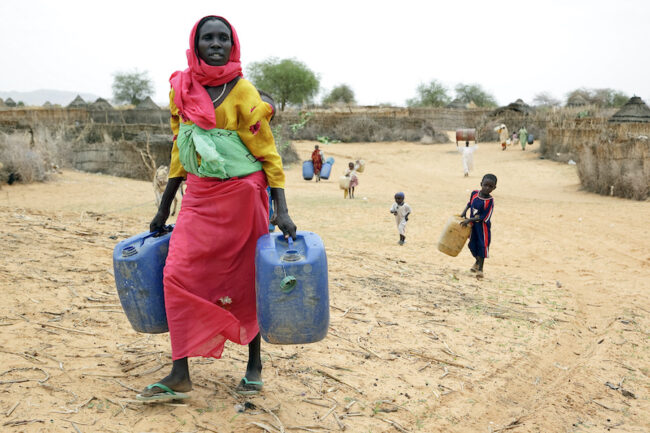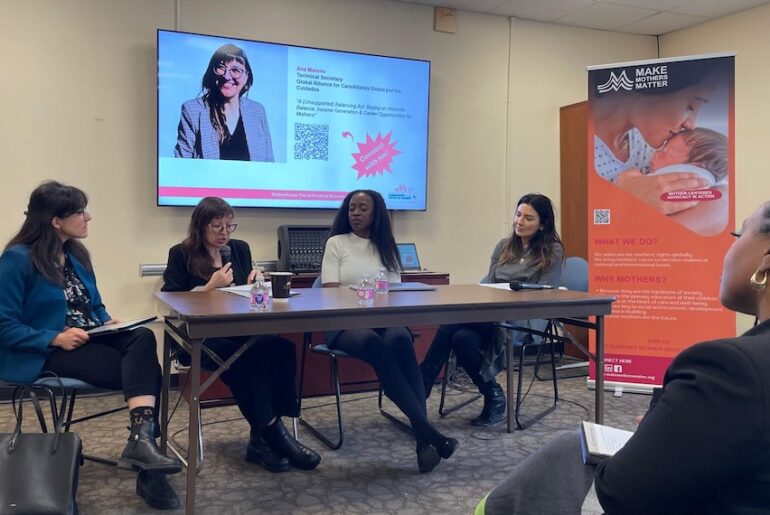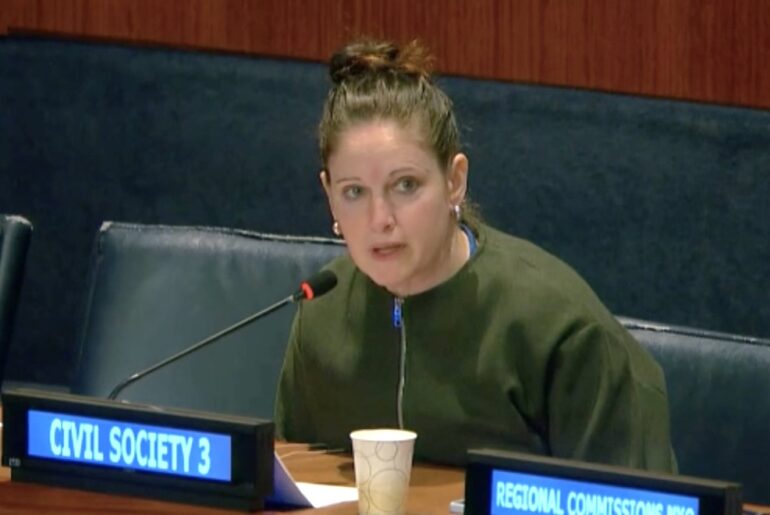Empowering mothers to mitigate and adapt to climate change
27.10.21
UN New York / CSW – In its written statement to the 66th session of the UN Commission on the Status of Women (CSW66), MMM brings focus on the specific impacts that climate change has on women as mothers, and the key role they can potentially play in mitigation and adaptation.

Climate change has become a global emergency, already impacting the lives of many and threatening the lives of even more people. Like most crises, it has a multiplier effect on existing crisis like health, poverty or hunger; and it exacerbates existing inequalities and vulnerabilities. Women around the world are among the most affected by climate change – especially when gender intersects with other factors like ethnicity, age, disability, migrant background or low socio-economic status.
1. Mothers are on the frontline and experience particular challenges as they face climate change
- Climate change related extreme weather events such as droughts, flooding, salinization of soil and water, destroy the natural resources many mothers rely on for their family’s livelihoods. As a result, they need to walk longer distances to secure clean water and fire fuel for cooking, thereby further reducing the time they have for income generating activities. In fact, climate change exacerbates the lack of basic public infrastructure and services (including access to water and sanitation, energy, health and social services)
- Climate change has an important impact on agriculture, directly affecting rural women around the world, who represent 70% of the agricultural workers and are also often engaged in subsistence farming. It threatens their livelihood and their ability to feed themselves and their families
- Climate change impact on agriculture also results in food shortage, pushing food prices higher and making it increasingly difficult for the poorest families to feed themselves – in which cases a mother will prioritize other members of the family over herself
- Climate change impacts maternal, neonatal, and child health through maternal malnutrition, environmental risks, and emerging infectious – often waterborne – diseases. New climate patterns like heat waves particularly affect children and infants who are more vulnerable to dehydration and heat stress, as well as to respiratory disease, allergies and fever. The consequence of increased children’s health issues is an increase of unpaid care work for mothers
- Stress related to climate change effects, related disaster risks and the obligation to adapt also takes its toll on maternal mental health – so too, on a mother’s ability to take care of her children
- Climate change forces people to migrate in search of paid work and a better future. And because of social norms that deem it more acceptable for a man to migrate, it is first the men who migrate often leaving women behind, with children and older people
2. Mothers are also often the most concerned about climate change – which threatens their children’s future – and this triggers action
Research conducted in the US shows that 83% of mothers across the political spectrum are concerned about climate change – compared with less than 60%t of the general population.
This shows that well informed / educated mothers are also likely to be the most motivated to implement changes in their personal and family lives for:
- Mitigation: e.g. taking steps to reduce GHG emissions through low carbon practices, and more generally to reduce their environmental footprint through the choices they make daily for themselves and their families
- Adaptation: e.g. taking action to adapt to the new or expected circumstances, like adapting their crops and livestock to a new climate and environment, or using solar-powered cookstoves
Mothers also have the capacity to mobilize other mothers, organize and find new creative ways to take action at community level – e.g. solidarity actions. Mothers have the ability to motivate other mothers to demand action from their governments. That is what an organisation like Mothers Out Front is doing.
It is also no coincidence that the few countries leading systemic change towards wellbeing economies, i.e. economic systems that serve the wellbeing of people and the planet, are mostly led by women.
3. Empowering mothers to mitigate and adapt to climate change
Human action has been changing the Earth’s climate in unprecedented and destructive ways. Only human action at every level can possibly limit climate change and its effect.
While mothers are among the most affected by climate change, they are also well positioned to take action to mitigate and adapt to the effects of climate change. They are a force to be reckoned with.
We are therefore calling on member states to:
- Take action now, mobilize every stakeholder at every level, and cooperate with one another – time is running out
- Recognize the differentiated impacts that climate change has on women, in particular on maternal and child health, and on women’s unpaid care work and their ability to earn an income, feed their family and send their children to school
- Include maternal help in disaster response, include pregnancy care as part of resilience programs
- Inform and educate everyone, including women and girls, about climate change, as well as its possible mitigation and adaptation strategies
- Support and empower mothers to take action at the family and community levels
- Recognize the specific skills and knowledge that women can bring in climate action
- Take a participatory approach when elaborating adaptation policies; include women and grassroots women’s rights organisations in all decision-making to ensure that it is effective, that it answers the specific needs of women and children, and that it will not exacerbate inequalities and other vulnerabilities
Climate change, human rights and gender equality are indissociable.
![]() MMM CSW66 statement for download
MMM CSW66 statement for download
![]() MMM CSW66 statement as UN Document E/CN.6/2022/NGO/39
MMM CSW66 statement as UN Document E/CN.6/2022/NGO/39
The 66th Session of the UN Commission on the Status of Women will take place in March 2022 with the priority theme: Achieving gender equality and the empowerment of all women and girls in the context of climate change, environmental and disaster risk reduction policies and programmes.
Credit top photo: UN photo/ Olivier Chassot
Time Poverty and the Motherhood Penalty
Unveiling Economic and Social Injustices
09.07.24
Mothers play an essential role in families by ensuring their loved ones are nourished, educated, and healthy, but their unpaid care work often leads to economic and social injustices, known
Envisioning care as a common thread to global crises
29.07.24
UN New York - Our virtual HLPF side-event brought together experts to shed light on how the various global crises we face (in particular climate change and other environmental crises,
We call for multi-stakeholder approach to recognise and support unpaid care work
21.07.24
UN New York - Participating in the meeting of the UN Economic and Social Council (ECOSOC) on care and support systems, MMM reaffirmed the principle of co-responsibility, which should underpin








